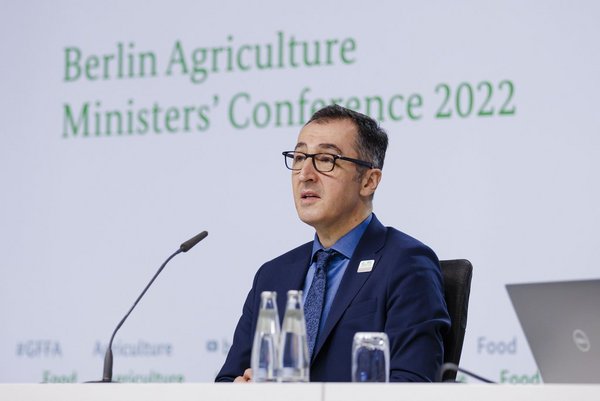 Read this article in French
Read this article in French- Share this article
- Subscribe to our newsletter
14th Berlin Agriculture Ministers’ Conference – Food Security Starts with the Soil
This year’s Agriculture Ministers’ Conference at the Global Forum for Food and Agriculture (GFFA) in January 2022 focused on the role of soils. Again, the conference took place digitally. A third of global soils are already degraded, and according to experts from the Food and Agriculture Organization of the United Nations (FAO), soil erosion could lead to a ten per cent loss in crop production by 2050.
“We stress that healthy soils are key in order to combat the global challenges of our times, in particular the production of sufficient nutritious and safe food, adaptation to and mitigation of climate change, and the halting and reversal of biodiversity loss,” the roughly 80 Agriculture Ministers as well as high-level representatives from international organisations agreed in their final communiqué entitled Sustainable Land Use: Food Security Starts with the Soil.
The Agriculture Ministers’ Conference had reached a common understanding on protecting and sustainably managing limited soil resources worldwide. Soil degradation should be minimised, and degraded soils should be restored. The Agriculture Ministers also emphasised the role of soils as a carbon sink with regard to climate change mitigation. Furthermore, they aim to establish rules for equitable access to land.
Key aspects agreed upon by the 14th Berlin Agriculture Ministers’ Conference are:
- Protecting our soils: Soil and land management must be sustainable, and soil pollution has to be reduced. Further soil degradation must be prevented. Soil information systems should be strengthened. Agri-ecological and other innovative approaches are to be supported. The positive impacts of sustainable pasture management on soil health are emphasised.
- Promoting climate change mitigation and adaptation: Healthy soils help climate change mitigation. Humus preservation and formation should be promoted, for example by adopting agricultural practices that sequester carbon and improve soil health. Greenhouse gas emissions from cultivated, drained peat soils should be reduced. The adaptation of agricultural systems to climate change ought to be improved.
- Preserving soil biodiversity to maintain healthy soils: The participants intend to advocate more strongly for the promotion of biodiversity in agricultural soils. Organic farming is considered beneficial to soil biodiversity. Nutrient management, including the application of fertilisers, should become more sustainable and efficient. The participants support the responsible use of pesticides and sustainable integrated pest management.
- Managing the Earth’s limited land resources in a sustainable manner: Agricultural land should be protected. Soil and land degradation must be avoided. Where feasible and appropriate, degraded soils should be restored. Soil sealing should be minimised. The goal of halting deforestation and the degradation of forests and other ecosystems by 2030 is reaffirmed. The participants intend to advocate for the development of sustainable agricultural supply chains.
- Granting equitable access to agricultural land: The Agriculture Ministers underline that rules for the acquisition and use of land are of major importance for safeguarding food security. Land acquisition must be in accordance with human rights and should take into consideration social and environmental impacts. The Agriculture Ministers support the Voluntary Guidelines on the Responsible Governance of Tenure of Land, Fisheries and Forests issued by the Committee on World Food Security and will promote their implementation. They particularly emphasise that women, young farmers and indigenous peoples should have access to land.
The Agriculture Ministers have agreed to discuss the progress made regarding the commitments in this communiqué at GFFA 2024.
(bmel/ile)
Read more and download the final communiqué at the bmel website





Add a comment
Be the First to Comment